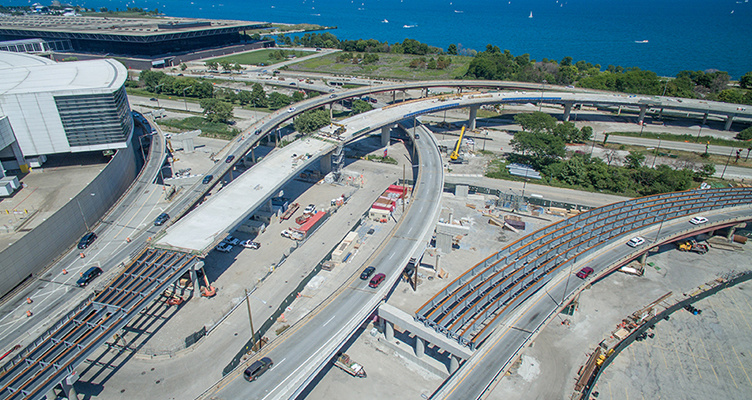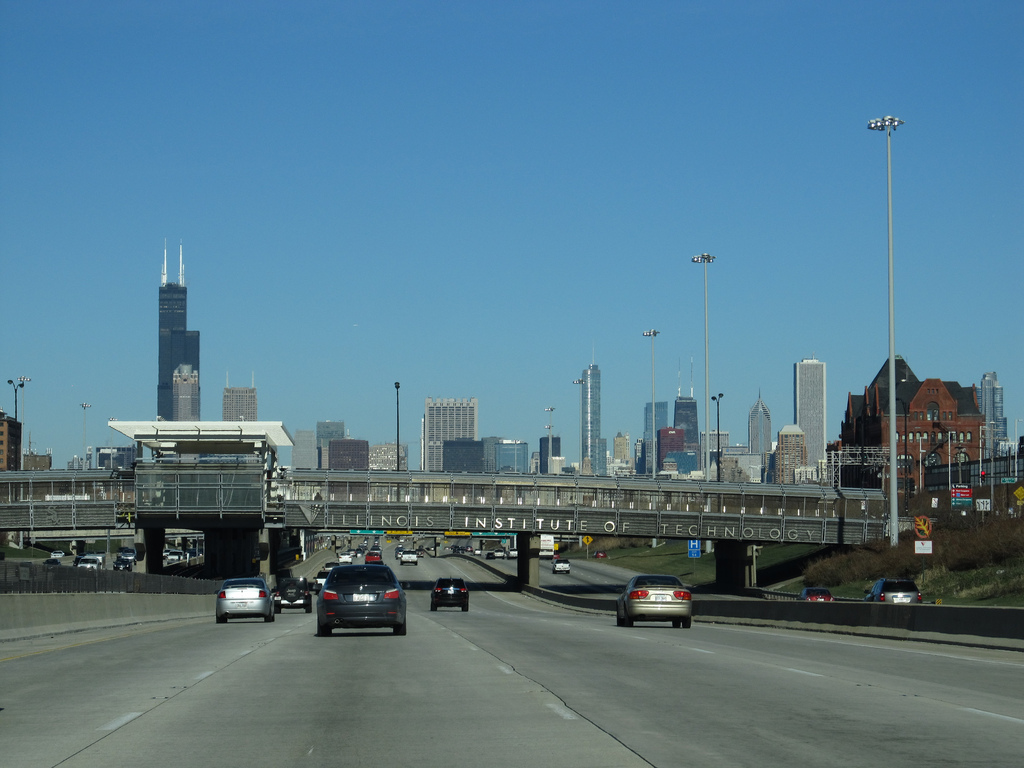- Details
 The Illinois Department of Transportation (IDOT) has earned the Grand Prize in the 2018 America’s Transportation Awards, the top honor for state departments of transportation. The award was presented to IDOT at the American Association of State Highway Transportation Officials annual meeting in Atlanta this week.
The Illinois Department of Transportation (IDOT) has earned the Grand Prize in the 2018 America’s Transportation Awards, the top honor for state departments of transportation. The award was presented to IDOT at the American Association of State Highway Transportation Officials annual meeting in Atlanta this week.
IDOT’s Interstate 55-Lake Shore Drive interchange took the top prize in the “Best Use of Technology & Innovation, Medium Project,” prize for its use of a temporary bridge to accommodate inbound I-55 traffic to southbound Lake Shore Drive.
“We are proud to bring this award home to Illinois for the first time,” Illinois Transportation Secretary Randy Blankenhorn said in a press release. “The innovation that made this project stand out represents IDOT’s enthusiasm and commitment for creating and maintaining a safe and efficient transportation system for travelers statewide. Our employees strive to find creative solutions each and every day in everything they do to keep Illinois moving.”
The project saves the public countless hours of delays by avoiding extended closures and detours during the reconstruction. It also increases safety, reduces congestion and connects a major interstate and an urban expressway near some of Chicago’s most popular recreational and educational destinations, according to IDOT.
The 2018 competition attracted 79 project nominations from state departments of transportation in 35 states. An independent panel of industry judges selected the Grand Prize winner, while the project receiving the highest number of online votes earned the Socrata People's Choice Award.
The award also included a $10,000 cash prize for a local nonprofit organization, which IDOT will give to the Special Olympics.
- Details
 O’Hare and Midway international airports will now provide free unlimited wireless internet for the first time to all travelers.
O’Hare and Midway international airports will now provide free unlimited wireless internet for the first time to all travelers.
The Chicago Department of Aviation (CDA) announced this week that the state’s two major airports will offer free Wi-Fi service with streaming capability, replacing time-based free Wi-Fi sessions at all locations in the airports.
CDA Commissioner Ginger S. Evans said in a statement the new service is being offered to enhance the passenger experience and to highlight efforts to modernize the Chicago airports.
- Details
Jesse White kicked off National Teen Driver Safety Week on Oct. 15, 2017 by announcing that teen driving deaths have decreased by 51 percent in less than 10 years.
kicked off National Teen Driver Safety Week on Oct. 15, 2017 by announcing that teen driving deaths have decreased by 51 percent in less than 10 years.
The graduated driver’s license program in Illinois was strengthened when the Teen Driver Safety Task Force was established in 2008 with the goal of decreasing the number of teen deaths in Illinois.
According to the Insurance Institute for Highway Safety, graduated licenses reduce teens’ driving risks by allowing teens to practice driving with supervision before getting their full- license and limiting in-car distractions. In Illinois, the new graduated licensing laws restricted hours of night driving for teenagers and the number of passengers that drivers under 20 can have in their car. Today, all states have some foundations of the GDL program.
- Details
 A recent report from the National Safety Council ranks Illinois as the top state in the nation for road safety. The State of Safety report focuses on eight categories, including: distracted driving impaired driving, seat belt usage, child passengers, older drivers, speeding, teen drivers and vulnerable road users.
A recent report from the National Safety Council ranks Illinois as the top state in the nation for road safety. The State of Safety report focuses on eight categories, including: distracted driving impaired driving, seat belt usage, child passengers, older drivers, speeding, teen drivers and vulnerable road users.
Illinois’ top grade on road safety would not have been possible without the work and commitment of Senate President John Cullerton, who has championed traffic safety legislation over the past 30 years.
The Senate President began working to improve road safety early in his career when he sponsored the Child Passenger Protection Act in 1983. This law required children under age 4 to use child safety seats in cars. This legislation was later updated in 2003 to extend protections to children under the age of 8 with the addition of a booster seat requirement. To learn more about child passenger safety laws, click here.
Soon after that, the Senate President sponsored legislation to require front-seat passengers in cars to wear seat belts. At the time, just over 15 percent of passengers used seat belts. Now, that number has climbed to 94 percent. The Senate President expanded this legislation in 2011, when he sponsored a bill to require passengers in the back seat of vehicles to wear seat belts as well.
To combat the rising number of teen deaths and car accidents, in 2007, the Senate President helped implement graduated licenses for teens. Under this legislation, teens progress through a series of tiered driving restrictions as they gain more experience.
While serving as the Senate President, legislation to curb distracted driving was implemented. In the time it takes to look at a text message, a car traveling at 55 miles per hour will cover the length of a football field. Since 2014, driving while using a phone is a ticketable offense. Drivers are still able to use hands-free features on their phones and one-touch dialing.
These important pieces of legislation have saved countless lives and contributed to Illinois’ recognition for having the safest roads in the U.S.
- Details

Illinoisans seem to be growing ever more mindful of safety as they hit the road this summer.
A recent study by the Illinois Department of Transportation said the rate of front-seat seatbelt usage this year is at 95.2 percent, a 1.1 percent increase from last year’s previous high of 94.1 percent. Illinois has required drivers and front-seat passengers to fasten their safety belts since 1985.



